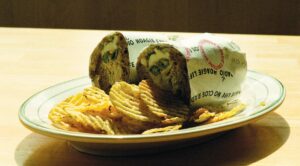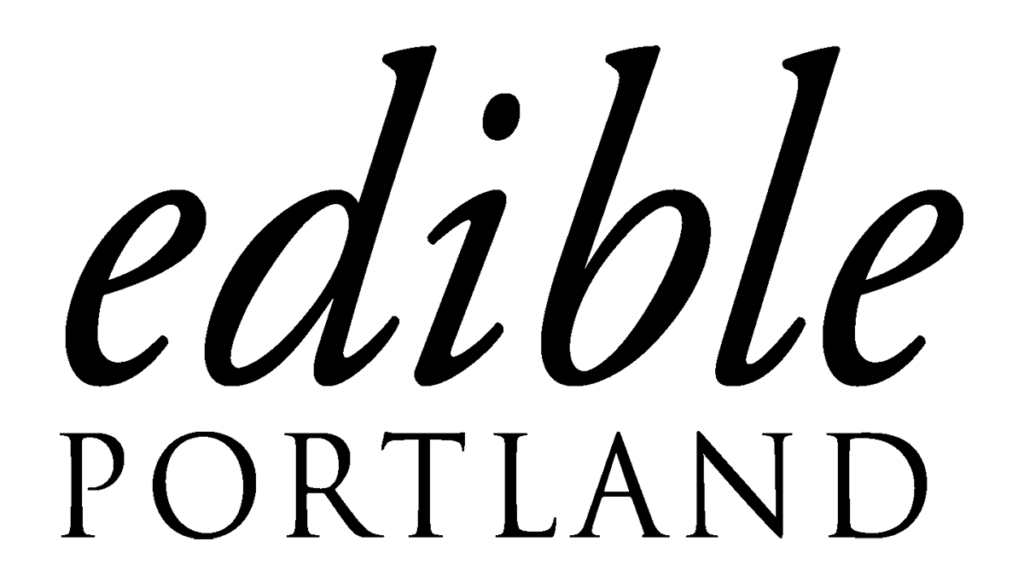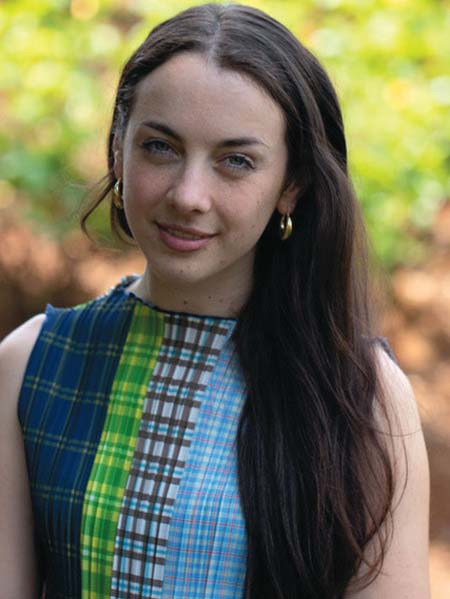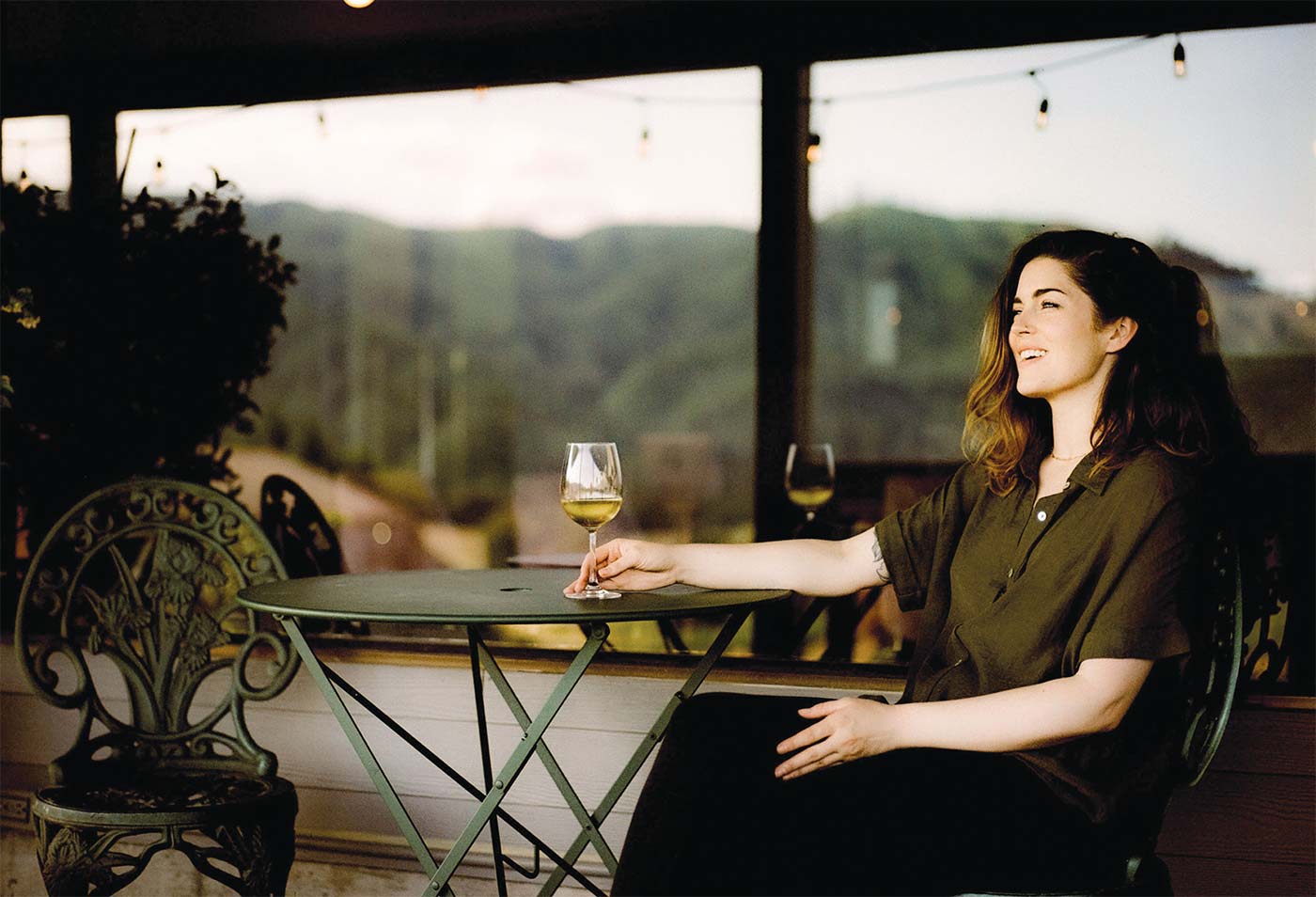
Broadcasting the good life
Wine tasting at No Clos Radio is like going to a friend’s house (a friend with the most beautiful 70-acre farm you’ve ever seen). Opened by Ross and Bee Maloof, warm, thoughtful hospitality is tantamount. When we arrived at the vineyard on No Clos Radio Café’s first weekend of the summer season, we were greeted by their sweet silver-faced puppy, Bones, who was just as welcoming as the staff.
Only a forty-five-minute drive from Portland, the property sits up against the Tillamook State Forest, surrounded by evergreens and literally “without walls,” which is the translation of the French “no clos.” Yearly, deer make themselves at home; elk migrate, mountain lions, lynxes, bobcats and a family of black bears live on the property. “It’s like we’re broadcasting our plant material, [the grapes] to the animal kingdom,” Ross said, hence the “radio” reference.
Ross, Bee, and a handful of their friends and staff ushered us in. We sat inside cozily (a late May evening in the Northwest doesn’t guarantee sunshine or warmth) and were grateful for our view of the property and surrounding hills out the windows.
“It’s so idyllic out here. We wanted to create an atmosphere where you could come and have a full dining experience if you wanted, but also if you want to just come with your friends and play backgammon, buy a bottle of wine and sit under the trees,” Bee said. “We wanted to offer both experiences.” They strongly emphasize backgammon, and we joked that it borders on cultlike. The two have played for years, and their encouragement sets the tone for a casual, community-oriented tasting experience. The Maloofs want their guests to relax, enjoy the property and take their time—desires that were immediately apparent.
The last thing they’d want is a cold, transactional experience in which guests are rushed through small tastes of wine. That weekend, they offered “vertical” tastings of two wines— Rouge de Gris and Ribolla Gialla. We tasted three vintages of each, the only variable being weather (same grape, same fermentation process).
No Clos has a hefty bottle list, and if you’d rather commit to a full bottle than a tasting, there are plenty of their wines. They also feature other local producers, particularly Fossil & Fawn, run by Jenny Mosbacher and Jim Fischer, with whom they share the vineyard and winery. The Maloofs have picked out their favorite wines from around the world, and a handful of “reserve” bottles grace the book.
Reserve bottles on the list have a twenty-sided die insignia to demarcate their significance. On-brand with their backgammon obsession; the Maloofs decided to “gamify” the ordering process—to purchase a reserve bottle, a guest has to roll a twenty on their twenty-sided die. The game also prevents the reserve bottles from getting bought up too quickly. These particular bottles tend to get price-gouged at restaurants. The Maloofs do a modest markup to make them more financially accessible and as a nod to the amazing, unique bottles they’ve been able to taste throughout their career, increasing the sense that you’re welcomed into the Maloof’s home as many reserve bottles came from their personal collection.
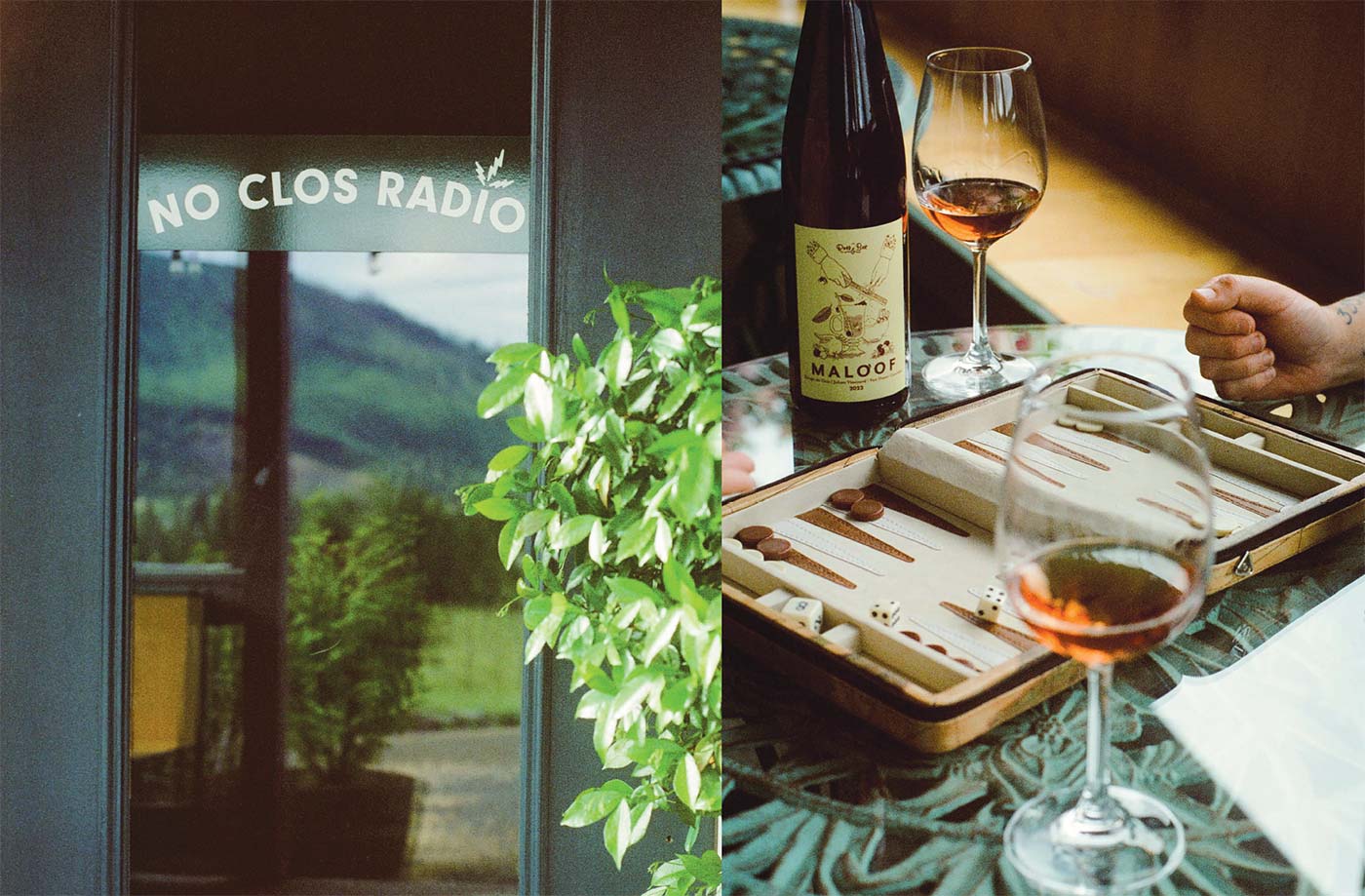
No Clos Radio Café opened last summer, but this summer, it embraces a prix fixe Saturday night dinner, reservation-only. “The menu reads like a Philadelphian goes to Paris,” said Ross, who grew up in New Jersey and moved to Philly at eighteen. They serve “tomato pie,” a Jersey classic, a weekly rotating hoagie, and pommes fondantes and duck breasts.
The Maloofs source hyper-local produce from organic Zephyr Farm, only a few miles from No Clos. They also utilize beloved Tabor Bread for their hoagie rolls, Otto’s Sausage Kitchen & Meat Market for a Toulouse-style sausage (made with Maloof wine), and Cowbell PDX for difficult-to-find cheeses.
The sole dessert on their menu is a “slice of wedding cake,” which Bee makes each week based on seasonality and her mood. They’re always three-tiered cakes, often employing herbs, unusual flavors, and original combinations. That Saturday in May, Bee made an unbelievably moist vanilla-infused cake made with Maloof Riesling, topped with a mascarpone frosting, a strawberry rhubarb compote, candied rhubarb, and a sprinkling of chervil.
The vineyard is one of the oldest in Oregon, with Pinot Noir planted in 1972. When they first met, Jenny and Jim of Fossil & Fawn say they fell in “friend-love” with the Maloofs in 2015. “It’s such an opportunity for winemakers like ourselves who’ve been making wine for less than 15 years but have a deep reverence for the history that comes before us,” Jenny said. All four winemakers rent the space, which helps them control costs. The alternative would be working with a “custom crush” facility, where your rent depends on how much product you bring in. These facilities typically charge tenants based on how many tons of grapes they process—the more you produce, the more you pay. This makes total sense from the perspective of the facility owner, but if the winemaker ends up with more grapes than they anticipated (hard to predict nature, as much as we try!), they could end up in a very tight financial situation.
Most younger generations of winemakers can’t afford to own property, so when Ross drafted up spreadsheets and pitched them on co-renting, Jenny and Jim couldn’t say no. Renting a winery has allowed Fossil & Fawn to grow. “Not having to worry about facility costs ballooning with production size enables us to make the best decisions for the wine, our growing partners and our business,” Jenny said. Jenny described her first time seeing the original plantings on an afternoon in February of 2020—almost dark, raining sideways—and being in awe. “You think about a vineyard in the winter, and it’s not so impressive—there’s no canopy or grapes, just these big stumps. But they were the most beautiful stumps we had ever seen.” The area was draped in electric green moss, mushrooms were everywhere, and the couple was sold.
The two winemaking teams created a draft system for choosing grapes to harvest. Fossil & Fawn primarily works with Chardonnay and Pinot Noir, while Maloof works with Gewurztraminer and Riesling. They all split the Pinot Gris.
The four winemakers have similar philosophies about winemaking. They use terroir-driven, vineyard-first, low-intervention winemaking practices. They want their wines to reflect the ground from which the grapes grow. Maloof and Fossil & Fawn identify as “natural,” but fitting into that category isn’t their priority.“The wineries that we always hold with the most respect and are enamored by are those that make unbelievably pristine, high-quality wine, and the fact that they’re natural is second; it’s almost irrelevant,” Ross said. The natural wine world often debates the use of sulfur in winemaking—a debate I won’t delve into here—. Still, Ross mentioned the importance of a tiny amount of sulfur when the wine is bottled because they ship internationally and need the wines to remain stable. He’s excited that this year, they’re choosing a single barrel of unsulfured wine to bottle and only allow people to consume it on-site, knowing that no-sulfur wine often won’t travel well.
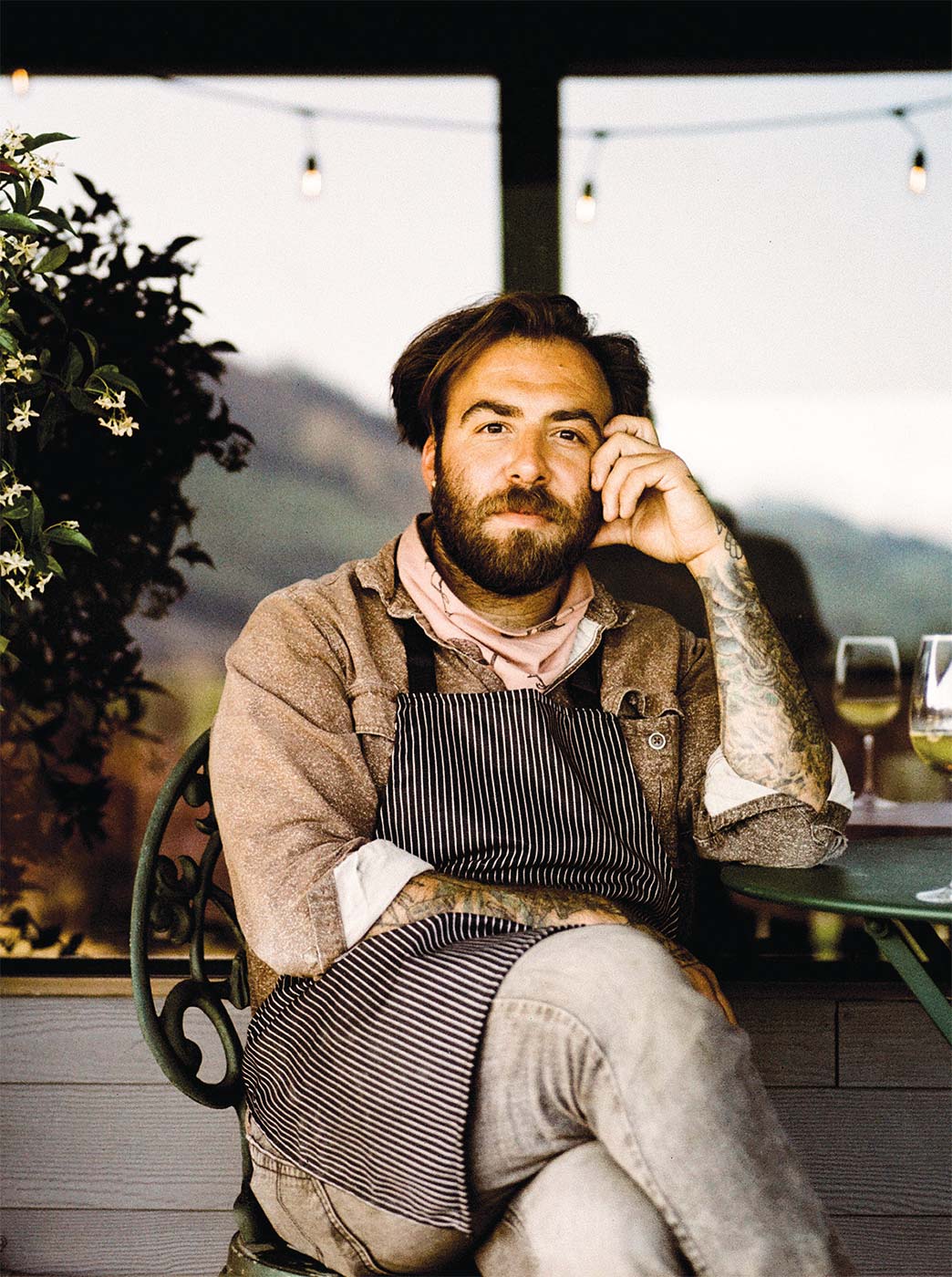
Before No Clos, Jenny and Jim made wine with grapes from a range of other vineyards, and they’ve always gravitated towards vineyards where the farmers or winemakers live. “The idea is that you live among the vines—so you’re not spraying anything you wouldn’t want right by your house,” Jenny says, indicating that sensibility has informed their overall winemaking practices. The friendship these four winemakers share is undeniable, and Jim and Jenny spoke to the uniquely Portland sense of community across their respective wine industry niches. They discussed how Portland has always attracted community-oriented, artistic people. “There’s a built-in sense of community that comes from groups of people who all have that same creative affinity,” Jenny said.
The city allows creative people to live close to a wide range of cultural, culinary, and outdoor experiences for a relatively affordable price (at least compared to other West Coast cities). Jim considers access to the Willamette Valley a significant privilege of living in Portland.
Jenny also mentioned the solidarity of Oregon winemakers since the 1970s, knowing that to stand out next to California, there had to be a strong sense of community—“Team Oregon,” as she said. Their current wine community is part of a big Facebook group in which they can share advice, ask for a spare tractor part, or question the best place to go for wine labels. “Just having these kinds of forums where you connect to all these different people helps to level the playing field and makes it feel like we’re all in it together,” she said.
Although Jenny and Jim aren’t directly involved with the restaurant at No Clos Radio (both winemaking couples describe the restaurant as the Maloof’s “baby”), the Fossil & Fawn wines are widely represented there. They also have a tasting room in Portland. “For folks who don’t necessarily want to make the drive out or can’t make the drive out, we bring the wine country to them,” Jim said. (By appointment only, we invite you to our livework space located in the heart of Northwest Portland’s Alphabet District. Like a speakeasy, you must find the entrance behind the dive bar in the alley next to the bagel shop. Contact them through their website. Courtesy Fossil & Fawn Website.)
On our first visit on Memorial Day Weekend, we bought a bottle of Fossil & Fawn’s skin contact Pinot Gris. Although we planned to take it to go, we couldn’t help but finish it on-site.
Visit No Clos Radio Café all summer—Friday, Saturday, and Sunday through Labor Day. After Labor Day, the Maloofs expect to transition away from full lunch and dinner service but will offer snacks and wine through the fall.
